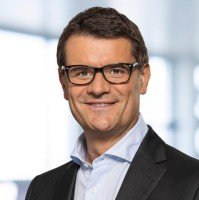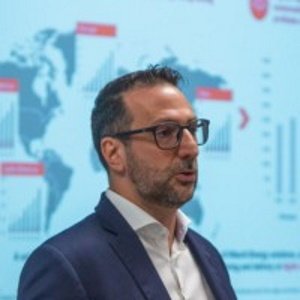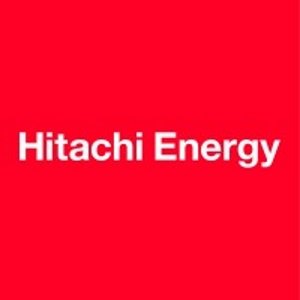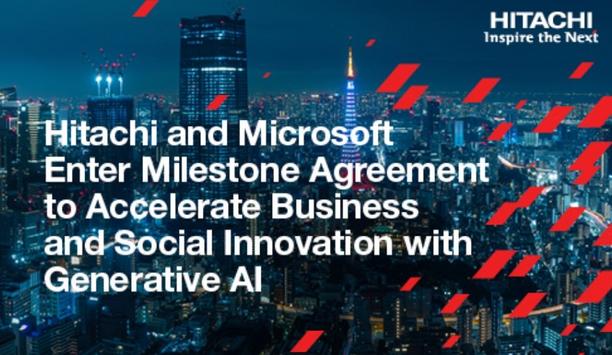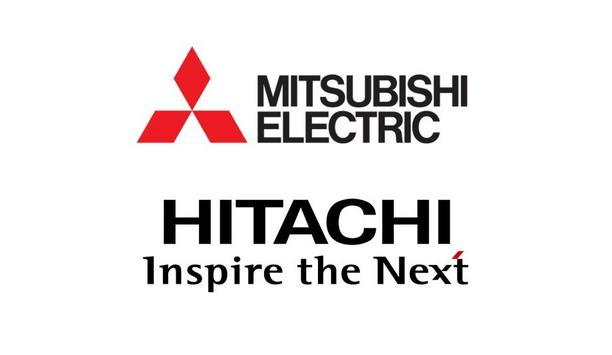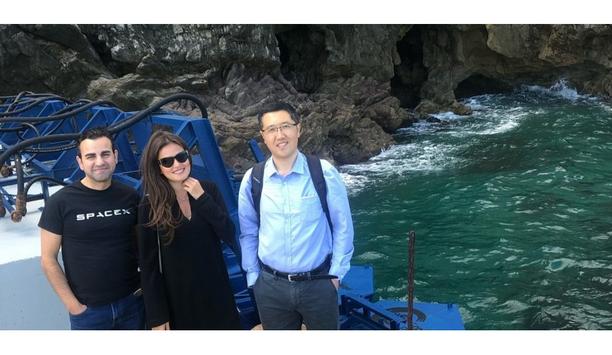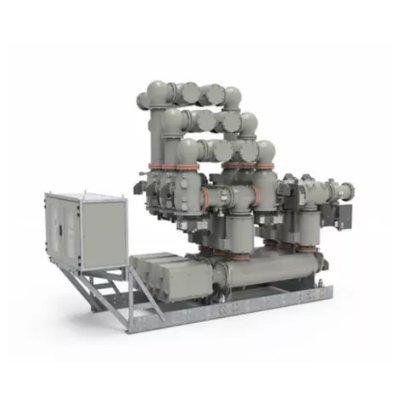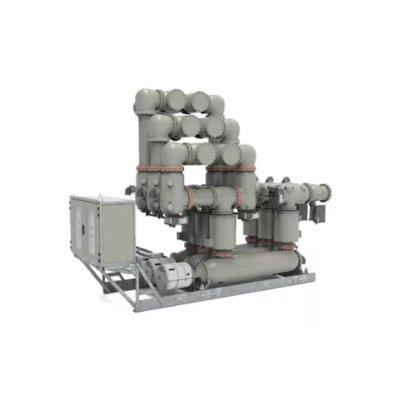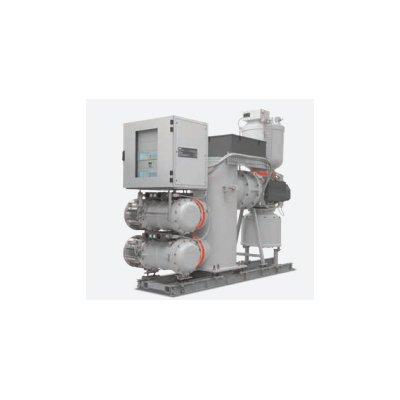Hitachi Energy - Experts & Thought Leaders
Latest Hitachi Energy news & announcements
Hitachi, Ltd. and Microsoft Corporation announced a projected multi-billion dollar collaboration over the next three years, that will accelerate social innovation with generative AI. Through this strategic alliance, Hitachi will propel growth of the Lumada business, with a planned revenue of 2.65 trillion yen (18.9 billion USD) in FY2024, and will promote operational efficiency and productivity improvements for Hitachi Group’s 270 thousand employees. Providing innovative solutions Specifically, Hitachi will embed the Microsoft cloud, Azure Open AI Service, Dynamics 365, Copilot for Microsoft 365, and GitHub Copilot into Lumada solutions to provide innovative solutions for the energy, mobility and other industries to deliver better outcomes for businesses and society. In addition, the two companies will promote joint projects to address pressing business needs In addition, the two companies will promote joint projects to address pressing business needs such as bolstering cloud services, enhancing security, and mitigating the environmental footprint of data centers, which have become an increasing area of focus with the growing use of generative AI. Accelerate social innovation “Hitachi has been driving transformation by applying AI across the Hitachi Group to improve productivity and will invest 300 billion yen (2.1 billion USD) in GenAI to capture new growth opportunities in FY2024. Hitachi and Microsoft have already been working on a variety of co-creation projects including the development of next-generation digital solutions for the manufacturing and logistics fields, and the development of a field-extended metaverse that runs on Microsoft Teams,” said Keiji Kojima, President and CEO of Hitachi. “Under this new agreement, we are excited to further accelerate social innovation by expanding our efforts to social infrastructure areas such as energy and mobility, and by applying generative AI, to improve the productivity of frontline workers, which will become even more important in the future. By combining our capabilities, we can help solve the issues faced by our customers and society, and contribute to a more sustainable future.” Improving operational efficiency “We are entering a new era of AI with the promise to deliver transformative business outcomes across every role and industry,” said Satya Nadella, Chairman and CEO, Microsoft. “Our expanded partnership with Hitachi will bring together the power of the Microsoft Cloud – including Microsoft Copilot – with Hitachi’s industry expertise to improve the productivity of 270,000 Hitachi employees and help address customers’ biggest challenges, including sustainability.” Hitachi’s Generative AI Center and Microsoft will collaborate to improve operational efficiency and application development within the Hitachi Group by using Copilot for Microsoft 365 and GitHub Copilot. Hitachi will also use Azure OpenAI Service to enhance its customer service. As part of Hitachi’s group-wide transformation, Hitachi will combine Azure OpenAI Service and GitHub Copilot with its systems development expertise to maintain high quality and improve productivity for mission-critical system development. Enhancing equipment monitoring Hitachi Rail is leveraging GenAI for predictive maintenance, enhancing equipment monitoring Hitachi’s internal validation confirmed that when its detailed system design knowledge was incorporated with Microsoft Azure OpenAI Service and GitHub Copilot, the application source code could be properly generated 70-90% of the time, resulting in high quality output. Hitachi Rail is leveraging GenAI for predictive maintenance, enhancing equipment monitoring and refining forecast accuracy. This proactive approach prevents breakdowns, increases service quality, reduces operating expenses, and augments safety. For example, a cloud-based platform on Microsoft Azure was utilized to streamline data visualization and analysis, empowered by AI to furnish data-driven insights to digitally monitor rail infrastructure. These insights were translated into actionable steps for Network Rail, enhancing decision-making for predictive maintenance of overhead lines. Develop innovative digital solutions Hitachi is enhancing its Lumada solutions by incorporating the capability of generative AI. As part pf the initiative, Hitachi has already started to use Microsoft’s Generative AI for JP1 Cloud Services, a SaaS version of JP1, its integrated operations management software with approximately 20 thousand customers. Hitachi is enhancing its Lumada solutions by incorporating the capability of generative AI This will accelerate response times to address failures, and enable improved operational efficiencies for IT departments, financial and public institutions. In an internal verification test conducted earlier, Hitachi confirmed that the time required for the operator to make an initial response to an alert was reduced to approximately two-thirds by using generated AI to respond to the alert and displaying the source of the citation, such as a manual, that provided the basis for the response. Reliable and sustainable energy In addition to this, Hitachi and Microsoft will also support the energy transition with improved access to and strengthening of digital solutions for asset performance management, energy trading, and risk management to reduce downtime and increase profitability.0 Increased computing power and cloud infrastructure are both critical to scaling these applications. Hitachi Energy’s Enterprise Software Solutions technology and its partnership with Microsoft is key to optimizing the energy network, from generation, through transmission and distribution, and ultimately in delivering reliable and sustainable energy to customers. Aim of sustainable innovation As the impact of CO2 emissions from AI on the global environment increases Multiple Hitachi Group Companies including GlobalLogic, Hitachi Digital Services, and Hitachi Solutions, deliver a wide range of digital engineering, IT & managed services, and application services for the cloud. Additional development efforts through this partnership will focus on enhancing this broad range of services with the aim of sustainable innovation with Microsoft. As the impact of CO2 emissions from AI on the global environment increases, Hitachi and Microsoft will work toward zero carbon, starting with a data center project in Europe, to reduce environmental impact. Hitachi will train more than 50 thousand GenAI Professionals. As part of the partnership, Hitachi will incorporate training to acquire advanced software development skills using GitHub Copilot and Azure OpenAI Service into the program to develop GenAI Professional, talents who support customers’ transformation using AI.
Hitachi Industrial Equipment Systems Co., Ltd. and Mitsubishi Electric Corporation have announced that they have agreed to transfer the distribution transformer business of Mitsubishi Electric’s Nagoya Works, which develops and manufactures factory automation (FA) equipment, to Hitachi Industrial Equipment Systems and integrate their businesses (hereinafter “Business Transfer”). After obtaining approval from the relevant authorities, assets and other items related to the distribution transformer business (development, design, manufacturing, sales, and maintenance) at Mitsubishi Electric’s Nagoya Works will be transferred to Hitachi Industrial Equipment Systems in stages beginning in October 2024, with completion scheduled for April 1, 2026. Business Transfer The Business Transfer does not include the transformers manufactured at Mitsubishi Electric’s Transmission & Distribution Systems Center, Ako Factory. Through this Business Transfer, Hitachi Industrial Equipment Systems will expand its product lineup of highly energy-efficient and eco-friendly transformers and accelerate the growth of grid edge solutions centered on power distribution systems, mainly in the domestic market. The company aims to contribute to the sustainable evolution of Japan’s power transmission Furthermore, the company aims to contribute to the sustainable evolution of Japan’s power transmission and distribution network by utilizing Hitachi Group’s wider capabilities in IT, OT, and Products. Mitsubishi Electric will focus on expanding its FA systems business based on its portfolio strategy of concentrating investments in priority growth businesses. Distribution transformers Distribution transformers serve the function of lowering the voltage of high-voltage electricity generated by power plants, so that the power can be used to meet the needs of the users. They are installed at relay points of the power grid, such as substations, public facilities, business facilities, and commercial facilities. With the global diversification of power generation sources due to the spread of renewable energy and the increasing demand for electric power due to the expansion of data centers and semiconductor manufacturing with the spread of generative AI and Digital Transformation (DX), the demand for power distribution transformers is expected to grow globally over the long term. Top Runner Program In Japan, the Top Runner Program under the Energy Conservation Law sets targets for improving energy consumption efficiency, and distribution transformers used in factories and buildings are expected to achieve improvement by 11.4% in the fiscal year ending March 31, 2027 compared to the actual value for the same period ending 2020. The improvement of environmental performance is becoming indispensable, and in 2026, the market is expected to expand by more than 10% from the 2022 level. Hitachi Group expanding its transformer business globally Hitachi Group expands transformer business globally as one of the key products for achieving carbon neutrality Hitachi Group is expanding its transformer business globally as one of the key products for achieving carbon neutrality. As a major manufacturer of distribution transformers in Japan, Hitachi Industrial Equipment Systems provides products that achieve superior energy efficiency by using 'amorphous metal' with low power loss in the iron core, and products that achieve high environmental performance and safety by using vegetable oil (ester oil). Furthermore, as part of the Hitachi Group, the global major in transformers, Hitachi Energy, is offering liquid-filled and dry-type transformers, as well as services for complete life-cycle support to utilities, industrial and transport sectors by ensuring high reliability and optimized performance while lowering life-cycle costs and environmental impact. Mitsubishi Electric’s distribution transformer business Mitsubishi Electric’s distribution transformer business based at its Nagoya Works has evolved and inherited technologies cultivated through years of experience. More recently, it has been promoting a rich lineup of Top Runner oil-filled transformers such as the R series, in pursuit of energy-saving performance. Looking forward, to strengthen the business further and ensure a stable supply of products, the company duly decided on the Business Transfer to Hitachi Industrial Equipment Systems. Hitachi and Mitsubishi Electric partnership The integration will contribute to the Japanese government’s aim to achieve 'carbon neutrality by 2050' Hitachi Industrial Equipment Systems and Mitsubishi Electric shared a common vision that integrating the technologies and assets of the two companies to improve energy efficiency and increase business value through the development and provision of more environmentally friendly products is the best way to achieve the advanced power transmission and distribution network required in Japan. Furthermore, the integration will contribute to the Japanese government’s aim to achieve 'carbon neutrality by 2050'. Accordingly, the top management of the two companies came to the agreement at this time. Industrial equipment supporting social infrastructure Yasuhiro (Charlie) Takeuchi, the President and Chief Executive Officer (CEO), Hitachi Industrial Equipment Systems, said “The desire to contribute to Japan’s carbon neutrality in 2050 is behind this integration. Hitachi Industrial Equipment Systems globally provides industrial equipment that supports social infrastructure and manufacturing, and transformers are indispensable products for building a greener and more intelligent domestic power transmission and distribution network in Japan.” Yasuhiro Takeuchi adds, “We are confident that through a steady integration process, we can contribute to realizing the sustenance of society within ‘Planetary Boundary’ which is the target of the Hitachi Group.” Nagoya Works distribution transformer business Toshie Takeuchi, Executive Officer (Group President, Factory Automation Systems), Mitsubishi Electric, said “Starting in 1952, the Nagoya Works distribution transformer business has over 70 years of production experience. We are pleased that Hitachi Industrial Equipment Systems will inherit our technology that has been cultivated over many years, as it can contribute to the development of the distribution transformer industry.” Toshie Takeuchi adds, “We will gradually proceed with the business integration while continuing our supply to the market. In the future, we will focus on expanding the factory automation systems business and our Circular Digital-Engineering business.”
Eco Wave Power Global (“Eco Wave Power” or the “Company” or “EWP”), a major, publicly traded onshore wave energy company, is pleased to announce that it has won a £1.5 million grant (the “Grant”) as part of a consortium led by Toshiba (U.K.) and Aquatera (U.K.) to design a pilot microgrid project for a remote island in Thailand. The £1.5 million grant is part of Innovate UK’s Energy Catalyst program Round 10, which supports U.K. and international businesses and organizations in developing market-focused technologies that provide clean, affordable and accessible energy. Consortium includes Eco Wave Power, Toshiba and Hitachi The consortium will utilize the onshore Wave Energy Converters (WECs) developed by EWP The consortium is led by Toshiba Europe Limited (“Toshiba”), Aquatera Ltd (“Aquatera”) and also includes Hitachi Energy Ltd. (“Hitachi”) and teams from the University of Manchester, the University of Exeter, the Asian Institute of Technology (“AIT”), and the Queen Mary University of London (“QMUL”). The consortium will utilize the onshore Wave Energy Converters (WECs) developed by EWP and implement advanced technology developed by the corporate partners and the university teams. Eco Wave Power’s WEC offers many competitive advantages Eco Wave Power was selected by the parties as Eco Wave Power’s WEC offers several competitive advantages, including cost-efficiency, insurability, reliability, environmental friendliness, and a forecasted attractive levelized cost of energy for low-income residents in islands, in comparison to solar and diesel generators. New technology to be developed as part of the project will include the development and deployment of: Novel and predictive control systems; A radar system to forecast wave heights to help avoid hazardous conditions and maximize WECs energy generation; A fully AI-based load and generation prediction system; and Wireless, distributed energy management system to provide electricity without expensive lithium-ion batteries. Second grant from Innovate UK for Eco Wave Power Professor Guang Li, of the University of Manchester, said: “This is a second grant from Innovate UK for the development and commercialization of the Eco Wave Power’s technology. In our previous early-stage project, we have numerically demonstrated the efficacy of our advanced control technology that can improve the onshore WEC energy output by at least 40%. This project will enable us to continue our study in this area to further promote the technology readiness level and significantly enhance the WEC potential.” Dr. Kamyar Mehran, the Project Investigator from QMUL, added, “I am excited to start our second phase of this project after our successful initial feasibility study. We would like to thank Innovate UK for the generous funding, which can pave the way for the commercialization of all novel technologies we have researched for years. I also believe with our great partners we can achieve all of our objectives in this project.” Grant - a strong vote of confidence in Eco Wave Power Inna Braverman, Founder and CEO of Eco Wave Power, commented: “We see this as a strong vote of confidence in Eco Wave Power and our pioneering technology and look forward to a productive collaboration with the team from Toshiba, Hitachi, Aquatera Queen Mary University of London, University of Manchester, The Asian Institute of Technology, the University of Exeter, and the Provincial Electricity Authority of Thailand.” Inna Braverman adds, “We are extremely grateful to Innovate UK for this Grant, as this project presents a unique opportunity for us to research a new technology application for our WEC, customized for islands and other micro grid applications, which are a significant target market for Eco Wave Power.” PEA - microgrid operator on the Thai island The Provincial Electricity Authority (the “PEA”), will act as the microgrid operator on the island The Thai electrical state enterprise, the Provincial Electricity Authority (the “PEA”), will act as the microgrid operator on the island and minimize the capital cost of electricity to provide an electricity tariff, as inexpensive as monthly mobile charges, without incurring any asset ownership and maintenance costs for residents. Aquatera, with its close collaboration with AIT, will be active in seeking further private and public investment for similar pilot projects in Thailand’s islands and even neighboring Southeast Asian countries with excellent potential for wave energy pilots. PEA officials said: “PEA is a leading organization in the region, which focuses on providing efficient, reliable electricity services, related business for developing the quality of life, and sustainability of economics and society.” Eco Wave Power Eco Wave Power is a major onshore wave energy technology company that developed a patented, smart and cost-efficient technology for turning ocean and sea waves into green electricity. Eco Wave Power’s mission is to assist in the fight against climate change by enabling commercial power production from the ocean and sea waves. Eco Wave Power received funding from the European Union Regional Development Fund, Innovate UK and the European Commission’s Horizon 2020 framework program. The Company has also received the 'Global Climate Action Award' from the United Nations.


